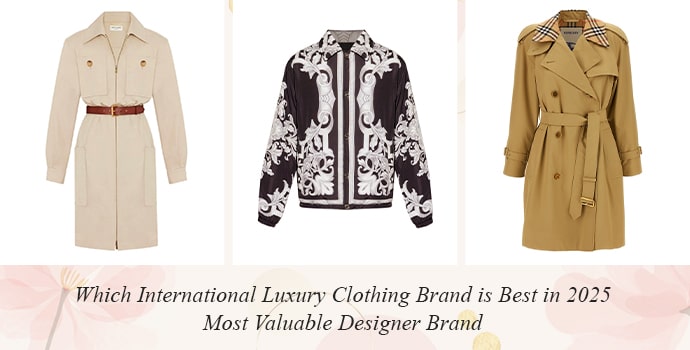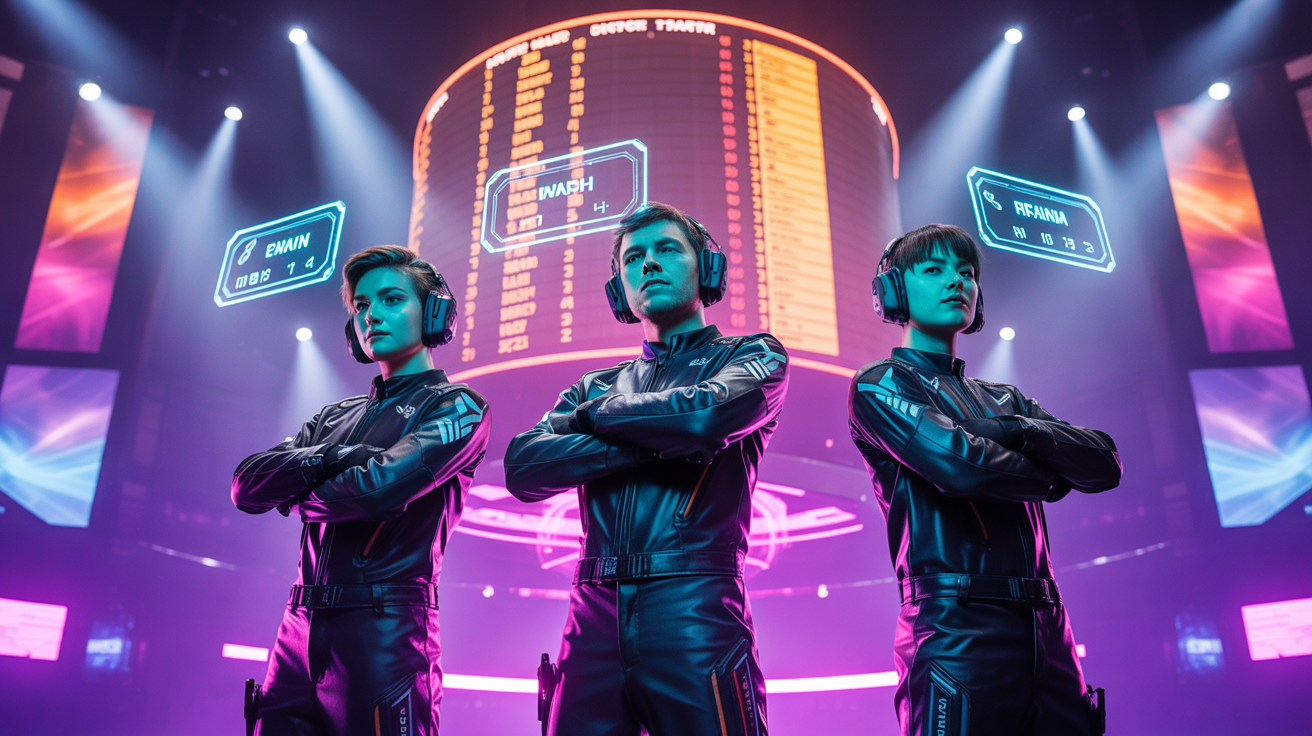Which International Luxury Clothing Brand is Best in 2025
Fashion has always been a self-expression, and for centuries, we have seen new trends and classic couture that express personal taste and style. In 2025 so far, the global luxury fashion industry is at an exhilarating moment in time, where tradition meets creativity, and exclusivity meets sustainability. With consumer priorities anchoring on authenticity, craftsmanship, and unique brand stories, international luxury clothing brands are reimagining new definitions of iconic. The competition for designer brands to be called “the best” and “the most valuable” has never been stiffer, as the long-standing historic fashion houses that have defined style for well over a century compete against daring new entries, driving transformation.
High-net-worth shoppers who previously only bought into the brand logos now want quality first, along with evidence of ethical production, and an experience with an emotional connection with the brand they choose to wear. As a result, top luxury names are investing in artisanal methods and cutting-edge fabrics and materials, promoting limited-edition releases as well as email invitations to exclusive shopping experiences where the fashion experience goes beyond mere clothing, making exceptional use of advanced digital elements like a digital fashion show or an AI-created model that selects custom designer clothing, or limited editions through circular fashion.
As all the brands in the luxury fashion industry present allure, some brands differentiate themselves by continuing to set trends for decades. The best brands are subjective and always depend on consumer preferences, but if we see revenue records and trends followed by celebrities and influencers online, some brands hold a special place in the hearts of fashion lovers. The brands and trends that will continue to have their place anchored by Chanel’s Parisian elegance, Gucci’s sense of daring creativity, Dior’s refined tailoring, and Prada’s flow of intelligent, culturally relevant minimalism.
This article explores which international luxury clothing brand stands out in 2025, analyzing market value, cultural influence, and the unique vision that cements its place at the pinnacle of style.
-
Chanel
Chanel has always been a favorite brand among celebrities as well as royalty for its timeless elegance and Parisian style. As known to be a prestigious luxury brand, in 2025, it was recognized as the most favorite brand for luxury buyers. The brand was founded by Gabrielle “Coco” Chanel, and from the very beginning, the brand has continued to define haute couture with its impeccable tailoring, tweed suits, and little black dress.
Chanel has embraced modernity while respecting its heritage with the current creative direction by continuing to use sustainable fabrics and even introducing a brand new digital arm for digital experiences in fashion. Some of Chanel’s accessories are recognized as status symbols around the world, and people cherish them and use them as heirlooms. Accessories like the Classic Flap Bag and No.5 perfume are leading the charge among a long, long list of accessories. Chanel has a relentless dedication to exclusivity, craftsmanship, and understated luxury for its customers, which helps make it a top choice among dedicated fashion buyers.
-
Louis Vuitton
A heritage brand that is known to be combining an innovative approach to its collection in 2025, Louis Vuitton was founded in 1854 as a trunk maker. LV has built itself into a deep-rooted, globally recognized brand of luxury defined by sophistication and adventure. The artistry behind the brand’s signature monogram canvas, leather goods, and ready-to-wear collections is astounding. Collaborations with acclaimed contemporary designers and artists add to these luxury products and keep them appealing.
The brand has combined its design with a dedication to sustainability and personalization, which is an attraction for contemporary consumers. Louis Vuitton offers everything from a lucrative runway presentation to fully customized luggage, while hedging thoughtfully between tradition and trendsetting creativity in the luxury segment. Louis Vuitton’s dominance in the luxury space showcases not only the products it makes, but it also represents the global lifestyle brand.
-
Gucci
Gucci is the name we often hear for being one of the favorite brands of celebrities globally. Continuing its charisma for years, in 2025, this luxury fashion house is standing strong as one of the globe’s leading bold, eclectic, and trend-defining luxury fashion brands. Gucci’s name continues to resonate with fans of the brand, fans of historical heritage, and those who just love the avant-garde. Gucci truly excels in vintage aesthetics in contemporary forms. On a more fundamental level, Gucci continues to embrace maximalism, sentimentalism, layering, and cultural perspective in ways that resonate with people decades in the future while still celebrating luxury Italian heritage.
The luxury fashion houses’ continued investment and focus on sustainable practices, re-useable materials, and imaginative digital runways and activations continue to appeal to new generations. Gucci accessibility captures statement pieces, tailored uniforms, and everything in-between for those searching for something original to climate their individuality and confidence in. Arguably, no other brand has the cultural mayhem and effect of Gucci, making it unjustifiably challenging to turn it into the largest title contender for being the best luxury brand.
-
Dior
In 2025, Dior remains one of the cornerstones of French haute couture, celebrated for sophistication and craftsmanship. Founded in 1946 by Christian Dior, the brand fundamentally altered fashion by cutting the couturier’s waist, creating the “New Look”. Today, the brand continues to alter the international sartorial landscape. Under stylish and visionary creative direction, Dior fuses classic elements with modern creativity. Their collections continue to capture the imagination of generations past, present, and future – with exquisitely constructed women’s dresses, men’s tailored and athletic, and the timeless Lady Dior bag.
Dior produces aspects of savoir-faire in couture and classic forms, plus utilises sustainable and textile resources at the same luxurious level as anyone else. The combination of the house’s heritage, innovation, and emphasis on the feminine-meets-modern will keep it on the short list of the most valuable designer brands.
-
Hermès
As a definitive sign of exclusivity and quality workmanship, each Hermes design continues to generate excitement after hours of hard work put in by skilled artisans for the next decade and beyond. Founded in 1837, this Parisian fashion house is most known for the Birkin and Kelly bags, silk scarves, and leather goods. Furthermore, Hermès embraces exclusivity as a firm principle, producing small amounts of products purposely, to drive demand for desirability.
Hermes put proper investment and commitment into preserving heritage processes while sourcing the best quality materials, to ensure long-term status for each piece acquired.
Hermès Fashion reflects desirability and recognition. There are a few luxury brand that ranks alongside Hermès at the top end of luxury fashion brands, as many others fade behind it.
-
Balenciaga
As of 2025, Balenciaga continues to be at the forefront of avant-garde and disruptive luxury fashion. Founded by Cristóbal Balenciaga, the brand has essentially become a cultural phenomenon through its oversized shapes, hybrids of streetwear and luxury, and its disruptive design philosophy. Where else can we say that a fashion brand can attract worldwide attention for creating runway shows that are a fusion of art, politics, and fashion?
Even today, Balenciaga is changing the fashion conversation by how we perceive luxury, as shown with sculptural gowns and chunky sneakers that became tomorrow’s runway trends almost instantaneously. It is Balenciaga’s sustainability initiatives and experimental digital-only collections that define its relevance and leadership position. As obsessively loved by celebrities and fashion outsiders, and underdogs, Balenciaga is uniquely irreverent in a commercial fashion sense, while still managing to be one of the most impactful designer brands.
-
Saint Laurent (YSL)
Saint Laurent defines Parisian culture, and with their Fall 2025 collection, they define the elegance of that culture. Founded in 1961, Saint Laurent, through designer Yves Saint Laurent, disrupted women’s fashion irreversibly, first introducing the tuxedo suit for women. Saint Laurent has now manifested its vision into a headline – a modern collision of tailored-ness, rock and roll, and sophisticated sensuality – with leather jackets, mini dresses, and boots that elongate your toes. The modern tale of craftsmanship and sustainable practices is still about the glamor of fashion that rides the moment for the modern, achieve-ready shopper. More than ever, with its monochromatic colors, aggressive shapes, and seemingly careless dress, Saint Laurent is still a luxury clothing brand unlike any other on the runway and the red carpet.
-
Versace
As we head into 2025, Versace remains the embodiment of vibrant glamour and unapologetic extravagance. Founded in 1978 by Gianni Versace, the brand is known for the colorful prints, bold cut, and Medusa logo that they are recognized for. Versace continues to be driven by a creative direction that empowers a high-octane aesthetic of confidence, sensuality, and extravagant beauty. The collections of Versace often allow for counterpoints for classical art in the context of current pop culture, whilst resulting in stunning moments on the runway.
Whether it be exhilarating floor-length gowns or ostentatious extravagance, Versace cleverly links into perhaps the newest, always back in trend pop culture signifier, based on the kind of celebrity clientele they have cultivated. It is the Italian craftsmanship, guilt-free creativity, accessibility, and marketability that allow Versace to maintain its position as one of the most valuable, popular, and recognizable brands in the world of designer fashion.
-
Burberry
Burberry continues to shift the definition of luxury in 2025, combining history and heritage with contemporary relevance. Originally well-known for its trench coats and branded check pattern, Burberry has become a global cultural relevance brand offering ready-to-wear, accessories, and outerwear. With a focus on technical innovation consideration, sustainable fabric-based consumption, and coming to market with a digital-first campaign, Burberry is inviting and inspiring modern luxury consumers.
Burberry’s runway collections demonstrate a balance between thoughtful tailoring and casual elegance across a range of collections attuned to the more casual occasion. Burberry’s ability to update while maintaining historical identity continues to positively impact its relevance and brand value, and has cemented its place in most modern luxury clothing opinions as one of the top clothing brands in the world.
The luxury fashion landscape for 2025 is a vibrant intersection of tradition and innovation, and cultural relevance. Each brand listed here offers its very distinct perspective on global style. Each has a constant history with quality, exclusivity, and storytelling; a preoccupation that exists beyond any seasonal trend.
In 2025, Consumers search for authenticity not just in terms of brand heritage, but modern relevance. These brands have found the right equilibrium between tradition and evolution. Their engagement with sustainable practices, innovation, and collaboration is consistent with cultural relevance. When the shift of consumerism changed to conscious consumerism, even the most established and historic fashion houses understood that they needed to be responsible and innovative to remain relevant. The fashion houses are creating the legacy of their brands for the future decades.
In conclusion, the answer to which luxury clothing brand is the “best” or most “valuable” in 2025 is much more than the financial ranking—it’s more about the emotional associations a brand creates, the space it occupies geographically, and the way of living it expresses. You may be a fan of the understated minimalism of Prada, the message imbued and driven designs of Balenciaga, or the timeless nature of Hermès, but they each represent their own distinct position in the developing space of luxury.
Luxury fashion is not just pretty clothing; they are an experience, values, and visions that typically transcend borders and making those the core brands of contemporary luxury.
Recent Post: Corteiz Windbreaker Pioneering Conscious in a Fast-Fashion World













